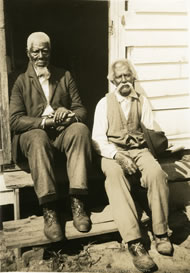From the WPA Slave Narratives:
Frank Childress age 84
 Frank Childress, left, age
84, and Nathan Best, age 92, ex-slaves in
Harrison County, sit on the steps of their housing at Beauvoir, Confederate
Soldiers’ Home. Photograph courtesy Mississippi Department of Archives and
History.
Frank Childress, left, age
84, and Nathan Best, age 92, ex-slaves in
Harrison County, sit on the steps of their housing at Beauvoir, Confederate
Soldiers’ Home. Photograph courtesy Mississippi Department of Archives and
History.
We next turned to Uncle Frank Childress, who was born 84 years ago in Memphis
Tennessee. His mother had Indian blood, and lived to be 105 years old, and his
father lived to be 97. His mother was housekeeper for Colonel Mark Childress,
who served under General Forrest. Frank
lived there until 12 years old. Uncle Frank told us a war story too.
He said "During the war I went to Richmond with my Marse Mark Childress,
carrying him whiskey and tobacco, wen I was a little over 12 years old. I was
captured by Grant at Clayton Mississippi wen I was 14, and to keep fum feein'
us He was goin' ter kill us, but Sherman said No, dont kill him. He served de
south, now let him serve de north, den he sed to me "Load dat cannon or I kill
you." an' I loaded it. I put four buckets of powder, put de flap back, den put
de ball in, and pull de crank, it rolled right on back and nearly jarred me
ter death."
Frank also told of how they were left with stolen money, As the yanks had
wagon loads piled high requiring 8 horses to pull the wagons, and of how he
was sent to Helena Arkansaw and put in a corral there, where he stayed until
after the close of the war. Frank spoke of having 14
children, now all dead, saying they had worked themselves to death on
plantations making 50 and 60 bales of cotton a year. He said preaching had
always run in his mind and he tried to be a preacher, and was sent to school
for ten years in Nashville Tennessee, to study to preach, as a methodist, but
down here I goes ter de catholic church --- all churches come out de catholic
church, it was de starting place, and a person must obey de Lord. I preached
at Memphis, Friars Point, Clarksdale, and Little Rock Arkansas, and dey took
me fum my church
and sent me down here ter live, en dey ought not to er done it, I ought to go
preachin' ergin. But dey treats me mighty good here. But de callin' is
stronger. I wanter go home."
Frank Childress Newspaper clipping, THE GUIDE, November 13, 1936 from Box
128J, folder "Racial Groups" - W.P.A. Collection, Mississippi Department of
Archives and History"
One day a soldier fighting for the South and the next a soldier, but firing
cannon for the North! A strange sounding record, but it's altogether true. If
the tale told by Frank Childress, 85-year old negro, who is spending his last
years at the Confederate veterans' home at Beauvoir.
"Yassuh, I'se the one what fought on both sides," he claims proudly, "but I
neber fought for de Yankees till dey captured me and put me in a corral and
said, 'Nigger, you fought for de South; now you can fight for de North."
And confirming every word that Frank says is Nathan Best, the other remaining
negro veteran, who accompanied "massah" to the war only to return minus one
arm.
Perhaps Nathan doesn't know whether Frank fought on both sides or not, for he
is nearing 92. At any rate state officials who checked back on the records
believe that the white-headed old darkey is telling the truth.
Frank Childress will tell you at one time that he was born in St. Louis and
the next time with just as much conviction will declare that he is a "Memphis
nigger, yassuh." He is firm throughout in the belief that his master was one
Colonel Mark Childress and himself lays claim
to the title of "nigger colonel," adopting his master's title.
The truth about it all is that old Frank did not fight for the South, but like
so many other faithful slaves accompanied his master to the War Between the
States, acting as body servant and dispatch carrier.
Captured at Richmond, he managed to get back to his master and accompanied the
colonel to Helena, Arkansas. It was at Helena that while carrying a dispatch
he was captured by Yankee forces, and at the express command of General U. S.
Grant, he says, began firing cannon
at Southern forces. For two and a half years he served with the Yankees.
Released at the end of the war, he made his way back to Clover Hill,
Mississippi, remaining there as a farmer until about two years ago, when his "jints
begin aching somethin awful" and he was admitted into Beauvoir, under the
provision which allows negro slaves who served
with their masters to be cared for.
Both Nathan and Frank live in the past, dreaming of the days when the old
South was at the height of its glory. They wouldn't take a million dollars of
those dreams. They know they haven't many more years here and they are waiting
to join their old "massahs."
Frank Childress from SOURCE MATERIAL FOR MISSISSIPPI HISTORY, Harrison County,
from microfilm"
See Nathan Best – Slave Narrative
Interviewer: Unknown
Transcribed by Ann Allen Geoghegan
Mississippi Narratives
Prepared by
The Federal Writer’s Project of
The Works Progress Administration
For the State of Mississippi